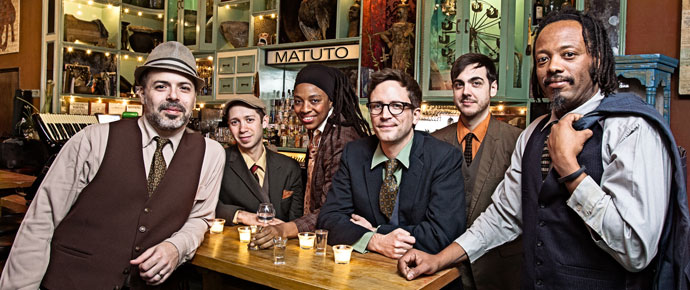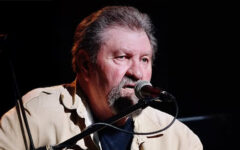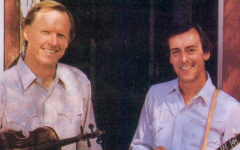
Just as bluegrass helps define an essential element of American music, when it’s translated internationally, it naturally takes in other additives that are indigenous to the countries where it’s performed. Matuto is an ideal example of a fusion that’s often generated in that collision of cultures. Formed in 2009 by a pair of American expatriates, guitarist Clay Ross and accordionist Rob Curto, the band offers a musical hybrid that defines its origins, both here and abroad.
Ross, born in South Carolina, journeyed to Brazil courtesy of a Fullbright Scholarship. His interest in music had originally been sparked by a preoccupation with classic rock, but after meeting Bela Fleck — and eventually becoming hooked on the music of Tony Rice — his interests naturally veered towards bluegrass. While he and Curto remain Matuto’s staples, the band’s revolving cast of colleagues currently includes Itaiguara Brandao on bass, Aynsley Powell on drums, and Ze Mauricio on percussion.
Matuto’s synthesis of styles incorporates a fusion of folk music of international origin — the sunny sounds of jazz, dance and rhythm, the celebratory style inherent in South American tradition, and naturally, American grassicana in all its varied forms. As the band notes on its website, it’s “bluegrass meets Brazil,” complete with the syncopated set-up that defines an international genre.
“We’re inspired by bluegrass, blues, folk, jazz, and brazilian rhythms,” Ross insists, noting that the majority of their material is entirely original. “I’d say we are Brazilian on the bottom and bluegrass on top. It’s all 2/4 time and the grooves fall together really organically.”
Both Ross and Curto immersed themselves in the country’s folkloric traditions during earlier visits to Brazil, and they brought that fascination back with them to Brooklyn where they’re currently based. That collaboration continues, even as it takes them from Carnival in Brazil to such international music gatherings as the WOMEX festival abroad. Likewise, they’ve toured the world as international ambassadors of the U.S. State Department, venturing as far afield as Portugal, Macedonia, Greece, Kosovo, Turkey, Belfast, The U.K., Senegal, Cote D’Ivoire, Ghana, Cameroon, Brazil, Thailand, China, Cambodia, and naturally, the United States as well.
To date, the band has three highly critically acclaimed albums, including their most recent, The Africa Suite, which they describe as “a series of original pieces based on the band’s engagement with the people, sounds, and traditions on the road as ambassadors.” It focuses on the band’s fascination with the cultural push and pull between Africa and the Americas, a reflection of the sounds they absorbed during their State Department-sponsored tour in 2013.
Not surprisingly then, their music has gone down especially well in Brazil, a place that still provides the heartbeat of their efforts. “I don’t think there is much of a bluegrass scene in Brazil,” Ross surmises. “But when we’ve played there they loved it. We played a festival there for over 10,000 dancing fans and it was unreal!”
Their’s is a sound he says, that’s “a true music, pure and from the heart.
Indeed, that serendipitous style retains its enthusiastic embrace of multi-cultural sensibilities and a creative collision of international ideas and sonic suggestion. It’s historic and traditional in nature, but also a remarkable reflection of an increasingly interconnected world, one which finds striking similarities between the heritage of the old world and the new, from Africa to Europe to the American heartland and beyond.
“I’ve heard Bill Monroe would tell musicians, ‘You can’t really play bluegrass because you’re not from Kentucky, you should do what you do.’,” Ross reflects. “I live in an ever dynamic and multi-cultural world. I guess this is my way of being inspired by Bill Monroe, but doing my own thing.







